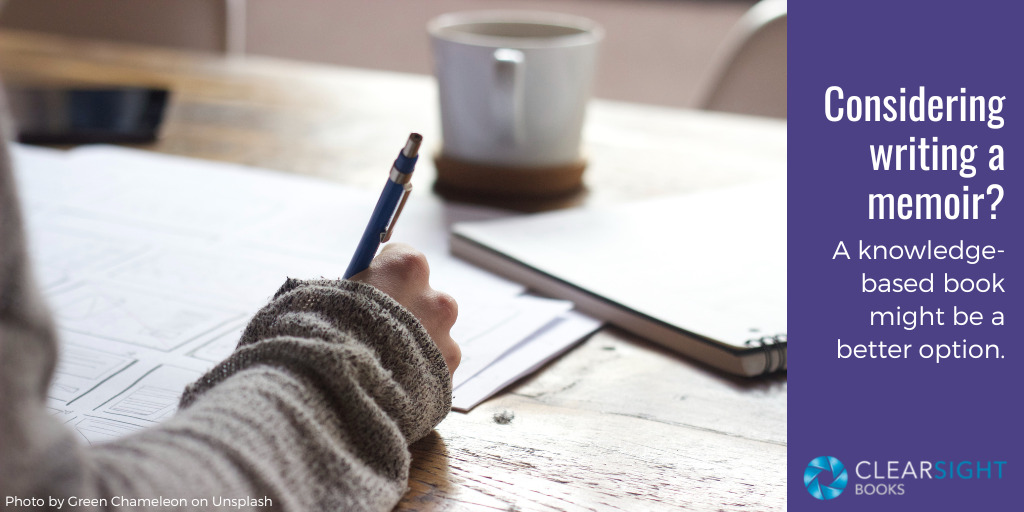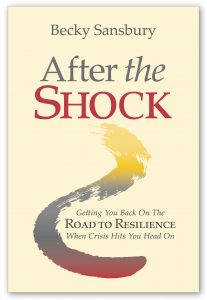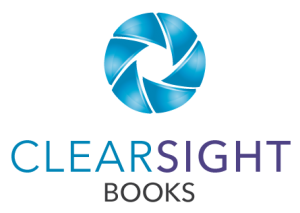
“You have such an interesting story—you really should write a book!” (Aw, you’re blushing.) You should write a book—but what kind of book?
I had an author approach me looking for an editor for his memoir. I skimmed the manuscript to see what it was about, whether it was a good fit, and how much work it needed. The author had had a long, successful business career, and wanted to share his stories for others to learn from. But as I read, I realized that memoir might not be the best form for his story.
Memoir or knowledge-based?
At Clear Sight Books, we work primarily with authors writing nonfiction books. They typically have a great deal of business and life experience, so they have an abundance of stories to tell and insights to share. There are two major types of nonfiction books they write: memoir and knowledge-based nonfiction.
A memoir is a personal narrative that tells the author’s life story or part of their life story. While a biography runs birth to death covering facts and dates, a memoir tends to be more thematic. It may trace a particular element through life or span a short period such as a specific journey or experience. For biography, think of books by presidential historian Doris Kearns Goodwin, who wrote Team of Rivals about Abraham Lincoln. For memoir, think of Matthew Perry’s recent book Friends, Lovers, and the Big Terrible Thing.
By contrast, a knowledge-based book takes the author’s personal experience, knowledge, research, and so on, and distills it all into lessons or principles or insights about their subject. Think self-help and how-to books like Stephen Covey’s The 7 Habits of Highly Effective People and Brené Brown’s Daring Greatly.
In a memoir, your personal story is the point. In a knowledge-based book, your personal stories support the main points.
Questions to decide which type of nonfiction book to write
As the author, obviously it is your decision what type of book to write (you are the boss of yourself!), but there are several questions that can help you decide.
- What’s your goal?
- Who’s your audience?
- How unique is your story?
- What is your writing skill?
Let’s look at each separately, but you’ll see how they overlap and fit together.
What’s your goal?
While specific goals vary, there are three common ones:
- Support your business. We often work with authors who are using their book to support their business in some way. They want to demonstrate expertise, build authority, give a taste of the value they add as a consultant, or something similar. If this sounds like you, a knowledge-based book is usually a better fit.
- Become a bestselling author. If your goal revolves around high book sales and becoming a bestselling author, you may be looking for a traditional publisher. Either book genre could work, but a book demonstrating your knowledge and expertise may be easier, depending on your writing skill and the uniqueness of your story (keep reading).
- Document history/leave a legacy. If you want to tell your story for posterity or capture family history, a memoir is probably the way to go.
Who’s your audience?
Along with clarifying your goal, consider your audience. Beyond your goal as an author, your readers have their own objective: they want to learn something, they want to be entertained, they want to gain insight about their own life. Remember, your readers are thinking, “What’s in it for me?”
- Business/niche readers. If your goal is to support your business, your audience is likely business clients, potential clients, colleagues, and so on. And your readers are likely interested in learning something they can apply to their business or personal life. In this case, a knowledge-based book is a good fit because there is clear alignment with what you want and what your audience wants.
- General/trade audience. If you want to become a bestseller, you are likely writing for a broader “trade” audience, especially if you are looking for a traditional publisher. Both types of book could work, but knowledge-based may be easier, again depending on your writing skill and story uniqueness (keep reading).
- Family and friends. If you are writing for posterity, your audience may be relatively small—family and friends—and a memoir is a fine choice. Just be realistic about your book’s potential reach.
How unique is your story?
Memoir is a tough genre in which to compete, especially if you are looking for a traditional publisher. Unless you are famous, it can be a hard sell. To be blunt, few people are interested in reading the life story of a random person. For a lesser-known author to have a strong-selling memoir, the story itself needs to be unusual, surprising, and compelling. If you have a unique story, memoir may work if you can tell it well (keep reading).
Of course we all have a unique individual story, and I’m not diminishing that fact, but many stories fall into common patterns (_hand raise_), which reduces the entertainment value and insight provided. Unless your story is truly out of the ordinary, a knowledge-based book may be a better choice.
What is your writing skill?
The final element to consider is the quality of your writing. In addition to needing a strong story, memoir also needs strong craft, especially if you want a traditional publisher. A memoir is similar to a novel in that it needs the same type of narrative arc and character development. If you are a skilled writer, give it a shot.
On the other hand, knowledge-based books require that you teach and share information. As a result, the writing craft is less critical. Of course your book needs to be well structured and edited, but readers are looking for clarity and relevance more than a fine turn of phrase.
Real-life examples
Here’s how the genre decision played out for some of our clients.
Gerry Toledo consults on leadership and business improvement. His book, Stop Executive Anarchy: Become a Better Leader, Optimize Your Business, Improve Your Life, covers his philosophy and many of the tools he uses in his practice. While this book would probably not make sense as a memoir, it is replete with stories that support his approach.

Becky Sansbury has a wealth of experience as a hospice chaplain and could have written an inspirational tear-jerker of a memoir. While After the Shock: Getting You Back On the Road to Resilience When Crisis Hits You Head On opens and closes with a mini-memoir, the book itself is a distillation of the lessons she learned, tools to use in crisis, and supporting real-life stories.
In Breathe Freedom: The John McNeil Story, John McNeil shares his experience of using deadly force in self-defense and being arrested for it nine months later. This astonishing account is a natural fit as a memoir, but there is the potential for using the same experience as a jumping off point for a book about, for instance, needed reforms in the justice system.
Janice Mitchell’s story is amazing. My Ticket to Ride: How I Ran Away to England to Meet the Beatles and Got Rock and Roll Banned in Cleveland (A True Story from 1964) offers readers nostalgia, reflection, and a rollicking good tale. It would not have made sense as a knowledge-based book.
Jonathan Alcott had a long, successful business career and could have written a knowledge-based book, but instead he chose the memoir path and wrote Wouldn’t Have Missed It for the World: Memoir of a Small-Town Boy Who Dreamed of Success and Achieved It. And a sweet book it is.
You really should write a book!
Coming back to the potential client with the draft memoir… While the goal was fairly clear (share lessons), the story uniqueness and writing skill were not out of the norm and, as a result, the audience’s needs were not being met.
By shifting from a memoir theme of “how I succeeded in business” to a knowledge-based theme of “how you can succeed in business,” the author has an opportunity to share his best stories to support the lessons learned. The reader is both entertained and informed. Win-win.
Yes, you really should write a book. And considering your goal, audience, story, and skill can help decide which kind of book: memoir or knowledge-based. But remember that ultimately you are the author of your own life, so write the book you’re called to write.
Not sure what genre is right for your story? Get in touch at karin@clearsightbooks.com and we’ll see if we can help.

